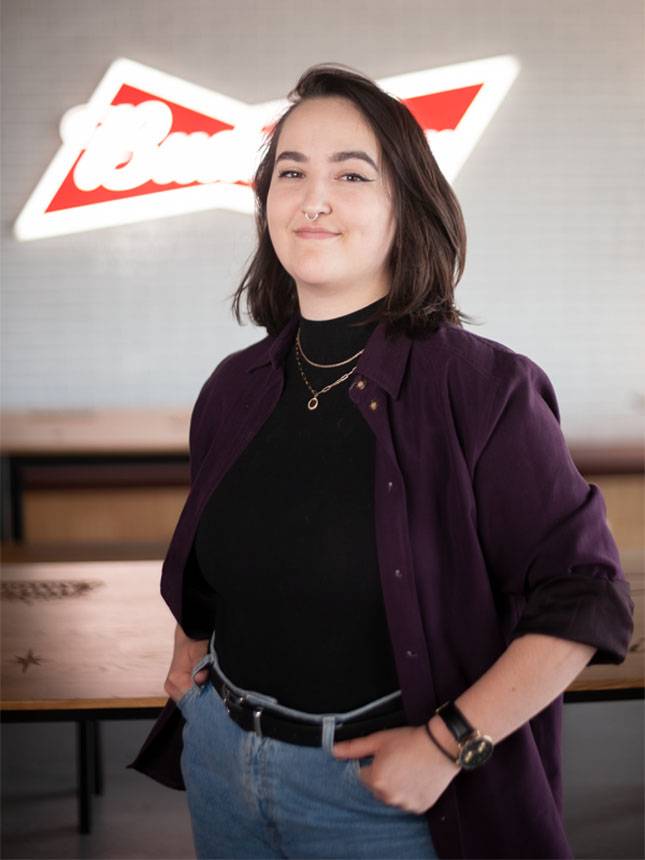
Celebrating Pride Month Across Europe: A Perspective From AB InBev’s Vero Proks
Interviews
AB InBev’s Vero Proks shares her Pride experiences across Europe, and explains why organizations must ensure the celebration is inclusive for all LGBTQ+ people.

Hi, Vero, can you introduce yourself and tell us about your role in your organization?
I am Vero Proks. My pronouns are she/they. I identify as a lesbian, gender-nonconforming woman. I work as Corporate Affairs Expert for Zone Europe at AB InBev. My work centers around Environmental, Social and Governance initiatives, particularly relating to smart drinking, diversity and inclusion, co-ordination of effective external communications and reputation management across European markets.
What does Pride mean to you?
Pride means a lot of things to me. It is as a month when I can go out to a lot of LGBTQ+ events in town and walk in the parade, which is amazing by itself, as it was unthinkable a few years ago – and still is in many places around the world. To me it means humility and gratefulness to all the people who started the fight for our rights and our inclusion. Pride started as a protest against injustice and discrimination, and while it is a celebration of life now, we cannot get blinded by all the rainbows around us and forget we still have a long way to go. At the same time, Pride gives me hope for change.
What was the first Pride you attended, and how have things changed since then for the LGBTQ+ community?
I did not really attend my first Pride. I grew up in a city of Košice in Slovakia, where Pride parades were not really a thing until 2013, when I witnessed the first parade, by accident, when walking through the main street to meet some friends. I saw just a handful of people marching with banners and rainbow flags, surrounded completely by the police, followed by twice as many “extremists”, shouting slurs and throwing stones and eggs at the people in the parade. But the people marched on and finished the parade. While I do not live in Košice anymore, and am joining the parades now annually elsewhere, I am glad to read in the news that every year there are more and more people joining the march in Košice, with fewer “extremists” showing up trying to disrupt it. It shows slow change, and the perseverance of our community, but also how it is still far from a safe and cheerful celebration.
What advice would you give to someone attending Pride for the first time?
Have fun but be respectful! If you are an ally, make sure to amplify the voices of the LGBTQ+ community. Support the community even when it gets uncomfortable, and long after the Pride is over.
What can we all do to make sure Pride is inclusive for all LGBTQ+ people?
Inclusion does not only mean making sure everyone is present. We need to recognize that some struggles are greater and require more visibility. Last year, I was able to join the Nørrebro Pride demo in Copenhagen, where the march was led by QTIBIPOC (Queer, Trans, Intersex, Black, Indigenous, People of Color) followed by blocks of allies. The demonstration elevated the voices of QTIBIPOC through clear manifesto, speeches and chants, raising awareness of issues still faced by the community. We also celebrated life, through playing music, dancing and being our authentic selves. I found this approach very inclusive. Nørrebro Pride demo was, however, an exception to how Pride looks around Europe. While support is appreciated, I think that allies and organizations should remember and respect the purpose and origins of Pride, and not overshadow the struggles that LGBTQ+ people face with their own agendas.
What do you hope is accomplished by this time next year?
Legalisation of same sex marriage and an end to compulsory sterilisation of transgender people across Europe. Currently, as a foreigner in the Czech Republic, my relationships have no legal recognition unless my partner is Czech, which is crazy to think about if I want to plan my future here. My relationships have no legal standing in my country of origin either. My transgender friends still have to undergo forced sterilization just to have legal recognition of their gender, despite the practice being condemned as human rights violation. I hope to see both addressed as soon as possible.
How has your organization decided to mark Pride this year?
At AB InBev, diversity and inclusion is fully integrated in our business strategy and touches upon all functions, including Sales, Supply Chain, Marketing and others. Everyone’s voice is heard and as employees we have opportunities and space to voice change. We have employee groups, where we meet and brainstorm on activities we want to do internally and externally, and partnerships we want to create – all year round. Specifically for Pride in Prague, where I am based, we are planning documentary screening and a drag show in our office, as well as joining the parade to show support to our LGBTQ+ colleagues in August, while thanks to our partnership with Pride Business Forum we can elevate local events. On a whole company level we have secured panels and debates with experts, such as Tiq Milan and Michelle MiJung Kim to educate all our colleagues. On top of this, we are continuously reviewing our policies and looking for initiatives and organizations we can support all year round, including cooperation with Creative Equals, who support us in establishing inclusive brands.
What tips would you give to an organization celebrating Pride for the first time?
Give the job to your LGBTQ+ employees. I see so many organizations running campaigns where it is clear they have not asked a single queer person if the idea works. Support the organizations and initiatives fighting for LGBTQ+ rights financially, and amplify their voices. Review and improve your internal policies to be inclusive of all your employees. Ask yourself: Are you hiring and promoting LGBTQ+ people? Do you think about LGBTQ+ inclusion outside of the Pride month? Is your organization using gender sensitive language and strategies? What kind of policies do you have against discrimination? Listen, learn, and act.

